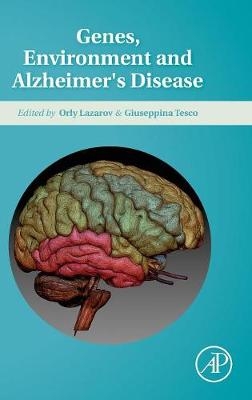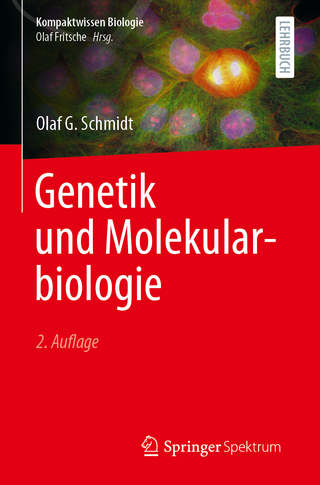
Genes, Environment and Alzheimer's Disease
Academic Press Inc (Verlag)
978-0-12-802851-3 (ISBN)
It is now clear that brain insult is an environmental risk factor for AD, while on the other hand, lifestyle components such as exercise and level of education may play a protective role, delaying the onset and/or severity of the disease. Evidence from experiments in rodent models of Alzheimer’s disease contributes major insight into the molecular mechanisms by which the environment plays its role in AD. Additionally, there are diseases related to lifestyle that may lead to AD. This volume reviews new discoveries related to all these factors, serving as a translational tool for clinicians and researchers interested in genetic and environmental risk factors for the disease.
Dr. Orly Lazarov is an Associate Professor of Neuroscience in the Department of Anatomy and Cell Biology at the University of Illinois at Chicago. She received a Ph.D. in Neuroscience from the Weizmann Institute of Science in Israel. She was awarded the Feinberg Graduate School Fellowship of Distinction for Outstanding Achievement in Studies and Research and the Yashinsky Award of Excellence for Distinguished Ph.D. Students. During her postdoctoral training at the University of Chicago she studied molecular and cellular mechanisms underlying Alzheimer’s disease. In 2006 she accepted a tenure track Faculty position as an Assistant Professor at the University of Illinois at Chicago. Dr. Lazarov was the first to show that experience in a complex (enriched) environment ameliorates Alzheimer’s pathology in a rodent model of the disease. Dr. Lazarov’s research is aimed at understanding brain plasticity, particularly, neurogenesis, in relation to learning and memory and cognitive deterioration in Alzheimer’s disease. Dr. Giuseppina Tesco is an Associate Professor (with tenure) at Tufts University. She received her MD and PhD from the University of Florence, Italy. She also completed her residency in Neurology at the University of Florence. In 1995, she was awarded a prestigious Fogarty Postdoctoral Visiting Fellow award to study the role of potassium channels in the learning and memory process and in Alzheimer’s disease at NINDS. In 1997, she joined the Department of Neurology at Massachusetts General Hospital and Harvard Medical School where she became Assistant Professor. In 2009 Dr. Tesco accepted a Faculty position at Tufts University. Her research focuses on Alzheimer’s Disease (AD). She identified a novel mechanism that regulates BACE1 levels and activity via the trafficking molecules GGA1 and GGA3 (golgi-localized gamma-ear-containing ARF binding protein 1-3). She was the first one to demonstrate that BACE1 is normally degraded in the lysosomes and that caspase-mediated cleavage of GGA3 and GGA1 produces BACE1 elevation in murine models of stroke and TBI. The importance of GGAs' control of BACE1 levels was supported by the observation that, in brain tissue from Alzheimer's patients, reductions in GGA1 and 3 were tightly correlated with elevations in BACE1, particularly in those areas most affected by the disease. Her work indicates that stroke and head trauma, can trigger a series of biochemical events that increase amyloid-beta production in the brain, and subsequent development of AD. Dr. Tesco’s studies may, ultimately, prove essential for the development of novel therapies that interfere with these biochemical signaling events and, in the process, reduce the risk of Alzheimer's Disease in stroke and head trauma patients.
1. What Is Cognition? Molecular Mechanisms of Learning and Memory Daniela Puzzo, Jole Fiorito, Rosita Purgatorio, Walter Gulisano, Agostino Palmeri, Ottavio Arancio and Russell Nicholls 2. When Cognitive Decline Becomes Pathology: From Normal Aging to Alzheimer’s Disease Eliezer Masliah and David P. Salmon 3. Adult Neurogenesis and Cognitive Function Keri Martinowich and Robert J. Schloesser
SECTION I. Genetic Forms of AD 4. APP and Cognition Robert Marr 5. FAD Signaling, PS and Cognition Li Gan
SECTION II. Environmental Factors 6. The effect of APOE genotype on amyloid-independent mechanisms Guojun Bu 7. Lifestyle and AD Orly Lazarov 8. Bace and Cognition Giuseppina Tesco 9. Traumatic Brain Injury and Rationale for a Neuropsychological Diagnosis of Diffuse Axonal Injury Douglas H. Smith 10. Alzheimer's Disease and the Sleep-Wake Cycle Adam W. Bero and Li-Huei Tsai 11. Stroke, Cognitive Function and Alzheimer’s Disease Katherine A. Jackman 12. Cerebral innate immunity: a new conceptual framework for Alzheimer’s David Gate and Terrence Town 13. Type 2 Diabetes and AD Marcelo Bonini
| Erscheinungsdatum | 03.03.2016 |
|---|---|
| Verlagsort | San Diego |
| Sprache | englisch |
| Maße | 152 x 229 mm |
| Gewicht | 840 g |
| Themenwelt | Medizin / Pharmazie ► Medizinische Fachgebiete ► Geriatrie |
| Studium ► 2. Studienabschnitt (Klinik) ► Humangenetik | |
| Naturwissenschaften ► Biologie ► Zoologie | |
| ISBN-10 | 0-12-802851-3 / 0128028513 |
| ISBN-13 | 978-0-12-802851-3 / 9780128028513 |
| Zustand | Neuware |
| Haben Sie eine Frage zum Produkt? |
aus dem Bereich


